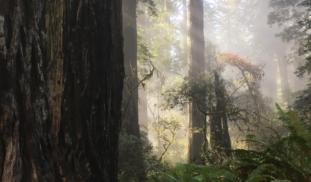Please wait...
About This Project
California’s two redwood species presently stand as Earth’s tallest, largest, most carbon-sequestering, and nigh oldest trees; their family’s fossils occur nearly globally. To better understand California redwoods' physiology and taxonomy, we study their stomata—pores—over canopy height. Are variations in their leaf stomata adaptive for vertical growth? Can species in the family be defined by them?
More Lab Notes From This Project

Browse Other Projects on Experiment
Related Projects
Reconstructing Historical Oyster Filtration in the Guana River Marsh Aquatic Preserve
The Guana River Estuary in northeast Florida is impaired due to excess nutrients, which can fuel eutrophic...
How do California redwood stomata change with height? What are the implications in physiology and taxonomy?
California’s two redwood species presently stand as Earth’s tallest, largest, most carbon-sequestering...
Can we use phytoliths in modern savanna soil to understand past ecosystems?
Phytoliths are microscopic silica particles produced by plants that can be easily fossilized and preserved...




